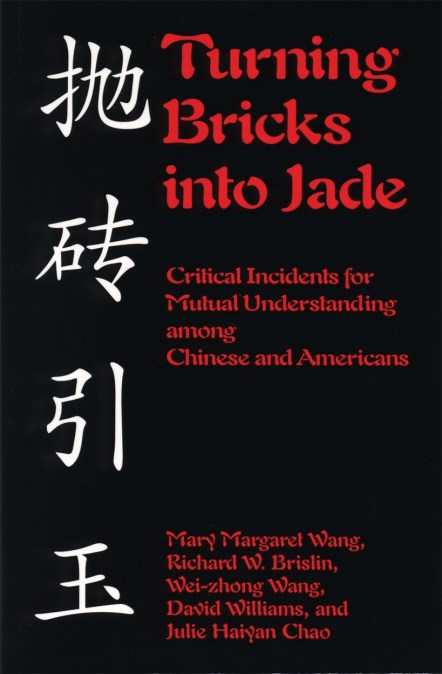The Chinese are fond of using four-character phrases, known as cheng yu, to improve their writing style. The Chinese characters on the cover spell out one such idiom: pao zhuan yin yu. Translated literally, this would be “throw bricks attract jade.” It can also express the idea of throwing out something of little value to induce a potential business partner to offer something more valuable.
The authors of Turning Bricks into Jade, a more idiomatic rendering of pao zhuan yin yu, like to think of each critical incident in this collection as a brick, which, when combined with similar bricks, good sense and effort, can be used to construct relationships more valuable even than jade.
A critical incident is a story about cross-cultural conflict or misunderstanding. Many of the forty-one incidents are based on actual events that involved one or more of the authors or their acquaintances. Some are a composite of several authors’ experiences. You choose one of four or five possible alternatives that explain the misunderstanding. Following each incident is a discussion of possible solutions, based on the authors’ experiences and grounded in current research.
Misunderstandings between Chinese and American interactants are complicated; there is almost never just one thing going on. One result of this complexity is that many of the incidents have more than one correct explanation. Forty-one Americans and Chinese with considerable experience in both cultures read the collection of incidents for validation. As you work through the incidents, you may feel the need for a more detailed explanation or definition of certain recurring themes. A section on key theoretical concepts in Chinese-American interactions provides such detail.
Included are individualism and collectivism, guanxi (interpersonal connections), hierarchies, gender relations in the workplace, regulations, deference to authority, work incentives and ownership. The Index of Incidents According to Themes and Concepts is also helpful.
The authors of Turning Bricks into Jade, a more idiomatic rendering of pao zhuan yin yu, like to think of each critical incident in this collection as a brick, which, when combined with similar bricks, good sense and effort, can be used to construct relationships more valuable even than jade.
A critical incident is a story about cross-cultural conflict or misunderstanding. Many of the forty-one incidents are based on actual events that involved one or more of the authors or their acquaintances. Some are a composite of several authors’ experiences. You choose one of four or five possible alternatives that explain the misunderstanding. Following each incident is a discussion of possible solutions, based on the authors’ experiences and grounded in current research.
Misunderstandings between Chinese and American interactants are complicated; there is almost never just one thing going on. One result of this complexity is that many of the incidents have more than one correct explanation. Forty-one Americans and Chinese with considerable experience in both cultures read the collection of incidents for validation. As you work through the incidents, you may feel the need for a more detailed explanation or definition of certain recurring themes. A section on key theoretical concepts in Chinese-American interactions provides such detail.
Included are individualism and collectivism, guanxi (interpersonal connections), hierarchies, gender relations in the workplace, regulations, deference to authority, work incentives and ownership. The Index of Incidents According to Themes and Concepts is also helpful.
Newsletter Signup
By clicking ‘Sign Up,’ I acknowledge that I have read and agree to Hachette Book Group’s Privacy Policy and Terms of Use

